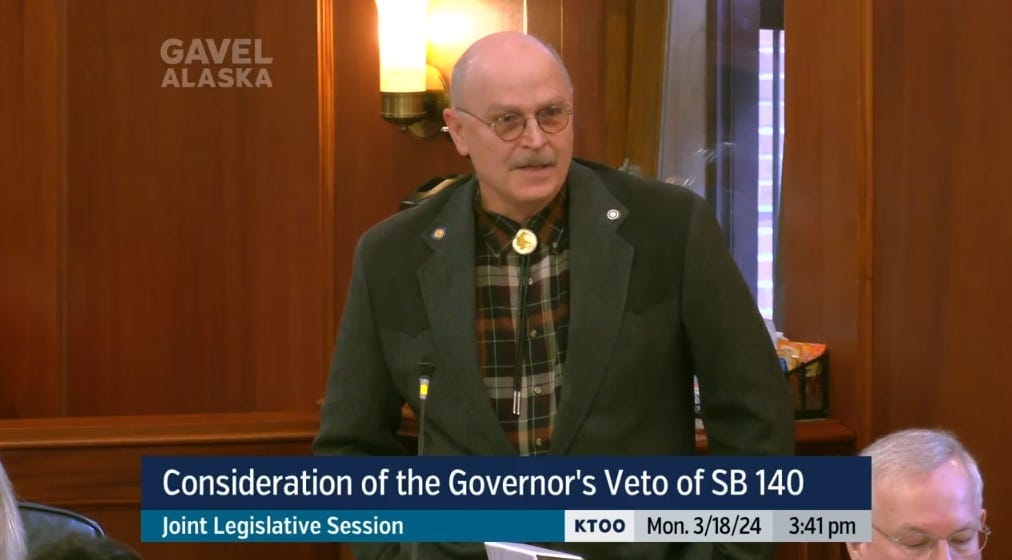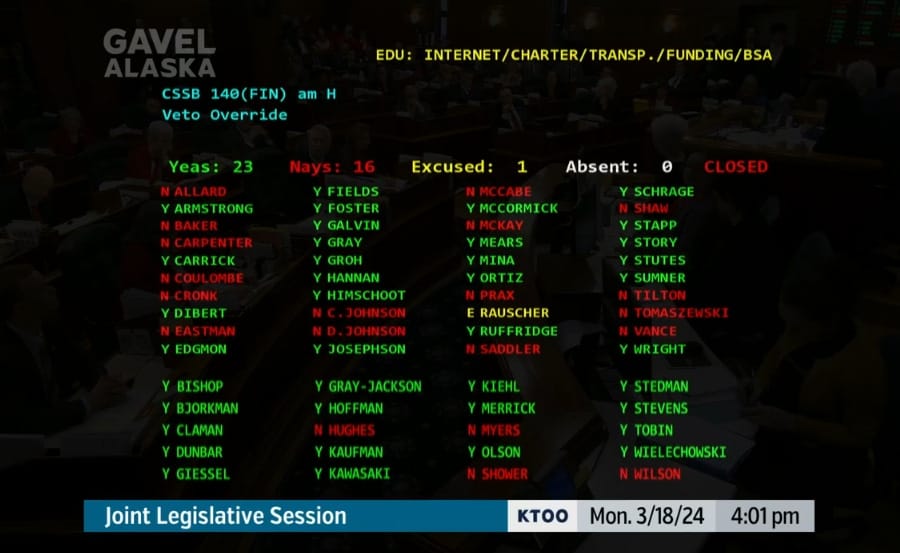'A bigger role'
We’re already looking at a rematch-packed election cycle that has the potential to reshape the Alaska Legislature.

Good morning, Alaska!
In this edition: With the filing deadline just a few days away, we’re already looking at an election cycle that will reshape the Alaska Legislature with plenty of rematches of close races and several narrow votes in the Legislature that will be the centerpiece of campaigns. In this edition, let’s break down how some of those headliner races are shaping up and what it could mean for big-ticket issues. But first, let’s look at one of the big surprises of the election season and what it means for 2026.
Current mood: 🌻
‘A bigger role’

Perhaps the biggest surprise of the election season so far is the announcement from pro-labor Sen. Click Bishop that he won’t be running for reelection. The moderate Fairbanks Republican was first elected in 2012 and has been an easy-to-like legislator, combining a bit of folksy charm with a consistently pro-worker mindset. His departure opens the door to the unknown, leaving a district that spans from the quite progressive west Fairbanks district represented by Democratic Rep. Ashley Carrick to the more conservative Interior district represented by Republican Rep. Mike Cronk that horseshoes around the Fairbanks North Star Borough, spanning from rural Interior villages to the Canada border.
But that’s not really what people are talking about.
While other departures are due to legislators stepping away from politics altogether, Bishop’s announcement wasn’t exactly subtle about his future plans.
“The time is right for me to prioritize and focus on family matters over the next two years. My parents recently passed on, and there are some gold mining opportunities I need to pursue. It’s also time for me to learn a few things from my grandkids as we prepare for the next chapter,” he said. “My family and I are not done with public service. There is still a determination inside me to fix our current path of rising energy costs and the loss of our working-age population. It is clear that addressing those issues requires taking on a bigger role than serving in the Legislature.”
Of course, two years would neatly align with an open shot at the governor’s office, a position that Bishop has long been rumored to be considering. If that’s the case, he will occupy the kind of moderate, centrist lane that, at least on paper, is well-suited to the world of open primaries and ranked-choice voting (which could be repealed in this year’s election, though there’s a lawsuit challenging it for technical reasons).
Just who he picks as a running mate will go a long way to shaping his path to office. A conservative running mate may be appealing to shore up the right but would likely undermine much of his moderate appeal and could be a fruitless endeavor anyway because there’s likely to be a more conservative Dunleavy-aligned ticket that would be difficult to peel off voters from. Instead, I’d expect him to look toward the kind of coalition building that has helped U.S. Sen. Lisa Murkowski and U.S. Rep. Mary Peltola into office that tapped into support from labor and Alaska Native groups.
The fight for the return to a public pension system could also play a significant factor in this race. The issue made strides this session with the passage of Senate Bill 88 out of the Senate, and a few flipped seats in the House could mean the same in future years. However, the reality is that the measure will likely be dead as long as Republican Gov. Mike “Abundant evidence of anti-union animus” Dunleavy is in office. Getting to a pension-friendly majority in both chambers is possible with a few flipped seats, but getting to a veto-proof majority of 40 across the Legislature isn’t likely to happen anytime soon. A Gov. Click Bishop would change that calculus.
But that’s about 2026.
Let’s talk 2024.
The Alaska Memo by Matt Buxton is a reader-supported publication. To receive new posts and support my work, consider becoming a free or paid subscriber.
Of rematches and narrow majorities

In 2022, Alaska saw several close legislative races decided by margins as narrow as seven votes. The results paved the way for Republicans to take a slim majority in the House and a moderate bipartisan supermajority to run the Senate, which went a long way to dictating what the Alaska Legislature could and couldn’t accomplish this last session. This year, more than a handful of votes were decided by a single vote, including the Legislature’s failure to override Republican Gov. Mike Dunleavy’s veto of a widely popular public school funding bill. Others—such as election reform, public pensions, abortion access or trans youth in sports—were stopped by who was in control of the chamber.
As the filing deadline approaches this Saturday, the Alaska Legislature could be on the cusp of significant changes. These shifts could either pave the way for more progress on issues like school funding, public pensions, election reform and the state’s financial situation or open the door to the right-wing culture wars that have been simmering in the most conservative corners of the Alaska Legislature.
Following the 2020 round of redistricting, Alaska elected one of the largest classes of first-time legislators in recent memory. Twenty of the state’s 60 legislators were new faces, thanks in large part to a large number of open seats. That won’t be the case this time, with many legislators expected to seek reelection and, as of writing, only four legislators have announced plans not to run for their seats—Anchorage Reps. Jennie Armstrong (D) and Laddie Shaw (R), Ketchikan independent Rep. Dan Ortiz and Nikiski Republican Rep. Ben Carpenter, who is running for Senate, and Sen. Click Bishop, as was discussed above.
About a third of the 50 seats on this year’s ballot are currently uncontested.
If we’re looking for seats with a high potential to be flipped, Anchorage has a bevy of races that are shaping up to be rematches of close 2022 contests, with some of those very close votes mentioned above looming large.
In South Anchorage, Republican Rep. Tom McKay is set to face Democrat Denny Wells. After completing the ranked-choice tabulation and recount, Wells came within seven votes of beating McKay in 2022. Republican Rep. Julie Coulombe is also facing a rematch of her narrow 2022 victory over non-partisan candidate Walter Featherly, whom she defeated by 112 votes.
Both Coulombe and McKay voted against overriding the governor’s veto.
East Anchorage also had close races set to be repeated this year. Republican Rep. Stanley Wright, who did vote for the override, beat Democrat Ted Eischeid by 72 votes and will face a rematch this year. Democratic Rep. Cliff Groh faces a rematch with Republican David Nelson, who fell 77 votes short of Groh in 2022.
Anchorage doesn’t have a total monopoly on rematches, though, with Nome Democratic Rep. Neal Foster set to rematch with Republican Tyler Ivanoff, whom he beat by 92 votes in 2022. The electoral slate includes several other rematches, but most were decided in 2022 by several hundred votes or more.
Find a complete list of candidate filings here.
A single vote can be the difference

Some big-ticket issues that were narrowly decided this year include the Leigslature’s failure to override the governor’s veto of a hard-fought compromise on an education funding bill. The measure would have made a $174 million increase in public school funding permanent, but the governor vetoed it because it didn’t include a controversial set of changes for public charter schools.
The Alaska Legislature ultimately approved the funding as one-time money through the budget, which the governor has indicated that he won’t zero out through a veto. Still, it’s left considerable uncertainty swirling around the future of public school funding in Alaska. Some of the legislators responsible for upholding the veto—such as Anchorage Republican Reps. McKay and Coulombe—had narrowly won their elections in 2022 and insisted a make-up bill was achievable after blowing up the bill.
As the chair of the House Resources Committee, Rep. McKay even introduced the House Republicans’ replacement education funding bill in an apparent nod to the political pressure he’s facing. His much-softened rhetoric on school funding, going from questioning any increases to professing his support, didn’t translate into any material success. Instead, the bill floundered in the final weeks of the legislative session and never even made it to a vote in the House, let alone in the Senate.
The education bill’s veto will likely affect several legislative races this year and was cited as a motivating factor in many of the rematches and new challengers.
In Homer, extreme-right Republican Rep. Sarah Vance—who has been a lightning rod for culture war issues and voted to uphold the education bill veto—will face several challengers this year, including Kenai Peninsula Borough Assembly President Brent Johnson. He told the Anchorage Daily News that he had first considered running for the Legislature more than a decade ago but was happy to stay in his community and work locally until he saw the impact of the education bill veto.
“I didn’t want to change any of that. And I held that position consistent, even though people asked me to run several times, until the failure to override the governor’s veto of education funding,” Johnson told the paper.
Other legislative outcomes were not quite as stark as falling a single vote short of a veto override, such as the House’s refusal to take up the public pension bill or an election reform measure on the final day of the session. That was more a product of conservative Republicans holding key positions in the House thanks to their hold on the speakership. That allowed them to sock away legislation restoring a pension for public employees—a frequently cited issue with the state’s recruitment and retention woes—in a special committee without ever taking it up in a meaningful way.
The same goes for a House election bill altered in the Senate to include changes intended to lower the high rates of ballot rejections in rural Alaska. Rural Alaska voters have long seen their by-mail absentee ballots rejected at a higher rate than most urban districts, a problem that has been partially attributed to the state’s requirement for a witness signature on ballots. There’s no process in place for those witness signatures to actually be verified—meaning they have never been used to identify fraud—and the state has no ballot-curing procedures. Both would have changed under changes advanced by the Senate, but House Republican leadership ultimately blocked the bill from getting a vote in the final days of the session.
While those issues could change with a Democrat-led or bipartisan-led House, things could shift dramatically to the right if the Senate’s 17-member bipartisan majority were to give way to conservative Republicans. The bipartisan majority eschewed divisive culture war issues this session, making it clear that they were not interested in taking up abortion restrictions or the House’s trans sports ban bill that consumed more than a day of the House’s time in the final days of the legislative session.
That would quickly change if conservative Republicans took both chambers.
That’s unlikely but not impossible, especially after Sen. Bishop’s announcement. Under Alaska’s election rules, only half of the Senate is up in a regular year. Seven members of the Senate Majority will not be on the ballot along with the chamber’s three ultra-conservative Republicans. It would take many flipped seats, including in some very blue districts, for it to flip.
The filing deadline is 5 p.m. on Saturday, June 1. The general election is on Nov. 5.
Stay tuned!
The Alaska Memo by Matt Buxton is a reader-supported publication. To receive new posts and support my work, consider becoming a free or paid subscriber.
The Alaska Memo Newsletter
Join the newsletter to receive the latest updates in your inbox.




